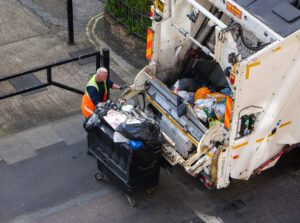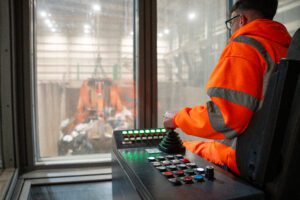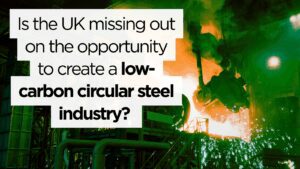By Charlotte Rule, ESA Head of Climate and Energy Policy
The Committee on Climate Change (CCC) published its 2024 progress report to parliament last week and has wasted no time telling the new Labour Government that it will have to “act fast” to meet the country’s needs against its emissions reduction targets – following a “slowing of pace” by the previous administration.
The report notes that, whilst progress has been made against the target to reduce emissions by 68 per cent compared with 1990 levels (all three carbon budgets to date have been met), urgent action is now needed to get the UK back “on track” to meet the 2030 target.
At a sectoral level, the report is somewhat critical of the emissions reductions made by the waste sector in recent years, particularly looking at the period from 2012/13 to present, concluding that:
- Landfill methane capture rates have been lower than expected
- There has been insufficient progress on recycling and composting
- Energy from waste (EfW) emissions have substantially increased
It notes that expansion of the Emissions Trading Scheme (ETS) to include the waste sector may help to achieve emissions reductions from EfW through the development of Carbon Capture and Storage (CCS), but that solutions need to be further developed. The report also includes a policy recommendation for the government to “address rising energy from waste emissions” but doesn’t provide specific details about how this should be achieved.
Fortunately, the recycling and waste treatment sector does have a clear plan to achieve net-zero by 2040, as set out in the ESA’s Net-Zero Strategy, but a supportive policy and regulatory environment is key to accelerating the pace of investment in decarbonisation and delivering the plan. Policy progress – particularly on plastics recycling – has been both slow and volatile over the past decade, resulting in nervous investors and stagnant national recycling rates.
The emissions generated by treating residual waste via energy-recovery are a direct product of the success, or failure, of upstream activities such as packaging and product design, consumer behaviour and communications, collection systems, recycling markets and funding/investment. Fundamentally, the more waste we produce as a society and the less we recycle, the more residual waste remains to treat safely.
It is therefore essential that the new Government urgently and successfully delivers the long-awaited packaging waste reforms (pEPR and Simpler Recycling particularly) and should also consider introducing an escalator to the rate and threshold of the plastics packaging tax. Driving plastic out of residual waste is a key upstream intervention to reducing fossil emissions from EfW but competition from virgin polymers and stagnant recycling rates are undermining this.
The CCC consistently (and erroneously) fails to recognise that the volume of refuse-derived-fuel (RDF) exports declined over the reporting period in favour of domestic treatment, which is why they view EfW emissions as rising. Emissions per tonne are actually declining as we continue to move away from landfill in the short term.
On landfill, no one-size-fits-all solution exists for optimal methane gas capture but ESA members continue to pioneer better gas capture techniques across their operational and closed landfill portfolio and urge adoption of best practice by the wider sector.
To support these efforts, the industry needs long-term certainty on the support mechanism for landfill gas capture beyond 2027 and the end of the Renewables Obligation (RO) for landfill gas to encourage investment. Longer term, we need to stop further waste going to landfill by implementing a comprehensive landfill ban for combustible materials by 2028.
The CCC recommends that a “moratorium” (which has become something of an unhelpful and stigmatising buzzword rather than dispassionate policy term in recent years) on additional EfW capacity should be introduced, subject to a review of capacity needs, and the ESA agrees with this view. Ensuring EfW capacity is balanced with present and future needs is absolutely critical but remains contingent on the outcomes of a wide range of policy scenarios.
As the CCC recognises, the expansion of the Emissions Trading Scheme (ETS) to waste could and should support decarbonisation of residual waste treatment through energy recovery (but only if the alternative aforementioned recycling ecosystem functions correctly) as well as investment in CCS to capture remaining emissions. ESA members are already leading the sector in applying CCS to EfW facilities, with developments by Viridor at Runcorn and Protos (Ellesmere Port) by Encyclis – facilitated by the HyNet carbon cluster.
However, in their current form, the ETS proposals set out in the live (at the time of writing) consultation by the UK ETS Authority are unworkable and may result in unintended or undesirable consequences. It is critical that the associated liability for emissions can be recorded and shared equitably across the value chain in order to drive the correct behaviours and investment.
The ESA has now produced and shared a full draft consultation response with its membership and has set out a strategy for the successful implementation of the ETS to our sector. Members can access these documents from our members’ area here and we urge all organisations across our sector to have their say on this vital consultation, which could have a significant impact not just on the economics of the sector, but on our collective contribution towards national emissions targets.




